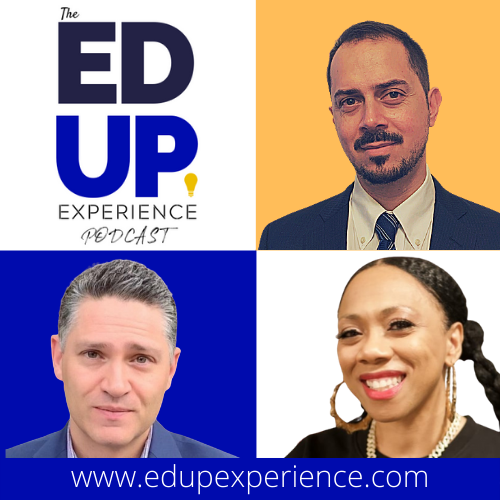Published on
Marketing to Students in Uncertain Times

The pandemic had created a frenzy for marketing, but has made institutions rethink the way they communicate with prospective and current students. It’s critical to adapt to their consumer behaviors and continuously innovating to meet their needs. In this interview, Dr. Joe Sallustio and Liz Leiba speak to Claire Foster about managing communications in unprecedented times, prioritizing recruitment and using digital marketing in a meaningful way for students.
EdUp Experience: How has Regent balanced the internal frenzy that the pandemic created?
Claire Foster (CF): It’s so important that everybody’s on the same page. The right hand knows what the left hand is doing. Internal communication is super important if you’re going to get external communication just right. I oversee all internal and external communications for the university, which is a challenge because it requires adoption across the board. You need partnerships in every area dedicated to that kind of awareness. We have a really close-knit executive team, keeping each other informed with daily and weekly updates. I then take that information and condense it into bite-sized units for my team and for all of the newsletters that have to go out: the new student communication, the current student communication, alumni and fundraising communications—it really has to span the whole gamut.
After starting with strong internal communication, you can then extrapolate that to your other distribution channels—communication for prospective or current students and alumni, and for donors and friends of the university.
EdUp Experience: How do you find shelf space for all the interests in marketing, with the limited number of channels to get all that messaging out?
CF: The key is prioritization. Every department demands attention and has important needs. But at the end of the day, our approach at Regent is to prioritize student recruitment and retention. If the students aren’t here—if we’re not getting new students, retaining current students, and graduating successful students—then there’s no need for us to be at the university. We try to keep it very student-centric and student-focused.
The market is super competitive right now. When you look at the higher ed landscape, there’s a lot of uncertainty, fear and anxiety for families and incoming freshmen. It’s a more difficult decision to choose a school. Last spring there was this thought that the pandemic was going to be temporary, that it would go away over the summer. But now, knowing the new realities we’re in, we have a long way to go.
The student experience has shifted so much. It’s created a lot of pent-up demand for a college student experience that delivers on the promises of a holistic education. Face-to-face instruction, student life and extracurricular activities are things everybody wants to be a part of their student experience.
Colleges have also had to shift. We’re finding ways to deliver on that promise in such a way that students and families are going to see the value in sending a student for an on-campus versus an online experience. It’s a big challenge.
EdUp Experience: What are some best practices to helping students and families understand the significance of online learning as a part of our new reality?
CF: The US News and World Report recently released their ranking for best online programs, and for the ninth year in a row, Regent University is the number one best online bachelor’s program. We are very thankful, humbled and honored—and it really comes back to the quality of our online programs.
When developing new programs, we’re aware that students ultimately want outcomes. Are you going to be able to deliver an exceptional student experience? Can you meet their expectations–help them get the credentials and information they need, while providing a transformative student experience? When they leave, they need to have the real-world skills they can take directly into the workplace and apply on day one.
We try to educate the whole person—mind, body, and spirit. We realize every student is a unique individual with unique experiences and a unique need for hands-on learning. At the end of the day, we want to make them successful and hand them something practical that they can take into their career.
EdUp Experience: How do you communicate the value of online learning in a meaningful way?
CF: There are no silver bullets when it comes to messaging. It’s very much about the brand. It’s about knowing who you are and the student body that you represent. But I’m a big believer in testing. Digital marketing has allowed us to throw out thousands of messages and figure out which ones consumers respond to. That’s an ever-shifting, ever-changing landscape. What was successful last year won’t necessarily be successful next year, so it’s important to test messaging and scale what’s successful.
EdUp Experience: How do you deal with the cultivation and capture-based marketing, and what is a layup drill you work through at Regent that is something that you test and continually tweak for better results?
CF: For us, a layup drill is the media buying process. Measuring on a daily, weekly, monthly, quarterly, annual basis where the dollars were spent and what yielded results. Being able to track a particular ad to an inquiry down funnel—then to an application, accepted student, enrolled student, stuck student, graduated student. The scientific approach to digital marketing has really opened up Pandora’s box for that kind of tracking, especially for knowing exactly which dollars yielded students. You then use those learnings to inform your next buying decisions.
One of the temptations when you think about cultivation is the framework that Google throws out there—think, do, love. Consumers, at the top of the funnel, are thinking about something. The next transaction, they’re doing something—applying or enrolling for classes—and then they love it. They’re a brand advocate. But as marketers, it can be tempting to spend too much of our time on the bottom of the funnel activities. So, you have to be mindful of that.
You have to be aware of the upper-funnel activities like brand advertising, student stories, testimonials, TV ads, billboards, regional awareness and other forms of communication about your university. All of those things work together to drive people into the funnel where they eventually think, do and love.
EdUp Experience: How do you work through the allocation of money and how do we use social platforms to cultivate and bring students to the institution?
CF: It’s two sides of the same coin. Multichannel attribution is a challenge because it’s only as successful as the implementation. Your ability to place pixels across every ad and every marketing channel that you’re doing, in theory. There’s a ton of products and software out there that claims to offer you full visibility on every ad that you have in the ecosphere, but it’s entirely contingent on your ability to implement that correctly. Then, how do you measure things like billboards or radio ads. So, that continues to be a challenge and something that marketers are working diligently to figure out.
The other question about brand is, essentially, what is your brand? It’s your reputation. It’s what people say about you when you’re not in the room. So, how do you protect that brand? The reality is, you can’t force that, it has to happen naturally. You have to be very cautious and cognizant of having internal communication protocols and a sales mindset, a customer service mindset. Where every touch point that a student can have with your university, you think of it as a customer service opportunity. All of that is going to impact your brand. It only takes one negative experience for the student to turn their back.
There has to be that vigilant focus on customer service and doing right by your customers. If a student is frustrated with something or they had a bad experience, an organization has to be able to come humbly to that student, admit the fault, and try to fix it. That’s a very tedious process, but ultimately, that is your brand and that’s what students are going to think about you. That will impact their decision as to whether or not they refer you to their friends or family members or anybody else. So, it’s definitely a constant process to protect your brand.
EdUp Experience: How have you guys been able to be so successful and what have you done differently?
CF: Your niche is your value proposition. It’s what sets you apart from every other major provider in the space. Aside from regional or geographical pole, what is it that sets apart a state institution from the others? The fact that Regent University is a Christian university is, honestly, one of the reasons we’ve been so successful in this pandemic. Our enrollment is growing, and not many colleges or universities in the United States can say that this year. We’ve worked very hard and very diligently to protect that brand.
So many of our students choose Regent because of our Christian foundation. We’re super dedicated to principles of excellence, innovation and integrity, and students want a sense of trust, transparency and honesty. Even choosing to pursue a degree at Regent University, when their future employers look at their resume and see that they have a degree from Regent University, there’s a sense of character development in that individual.
EdUp Experience: identity and value proposition are muddier than they used to be. How do you get the edge with what you have?
CF: We do a lot of focus groups and student surveys to pick their brains about why those chose Regent. They consistently tell us that it is the fact that Regent offers a high-quality Christ-centered education. So, they want the Christian atmosphere, and they also want the high quality, but brand identity is definitely a big part of it. What are the brand attributes and selling points that you can bring to the forefront? Serving students is a good way to get at that and understand the key selling points that we can highlight in our marketing and communications.
EdUp Experience: What do you think about the idea that you have to have a strong hold in the digital marketing and positioning to lead in the higher ed space?
CF: Higher ed in general has been slow to adopt change. It’s not seen as a super innovative industry, but that needs to change if we want to keep up with the times. You look at others for examples of the growth mindset. Amazon, Chewy and other startups have taken their profits and reinvested in growth. What is the product on the shelf in higher education? How do you continuously innovate and learn from consumer behaviors? We’re super focused on innovation at Regent and constantly tweaking, revising and updating. It’s a rapidly changing market, and if we’re not bringing value to our students, then why are we here?
EdUp Experience: Is there anything you’d like to add about Regent University and what do you see as a future for higher education?
CF: We just launched three new exclusive scholarship programs for on-campus students. We’re offering a $10,000 freedom scholarship, a $4,000 private school scholarship and a $4,000 home school scholarship. So, folks can learn more about that on our website. For the future of higher education, there’s an enrollment cliff. We’re going to continue to see mergers and acquisitions; we’re going to continue to see campus closures in instances where people are not able to recover from the losses of the pandemic. We’ll continue to see improvements, accountability and colleges focusing on the value that they’re bringing to students and the refinement of their programs in order to make students more successful.
Listen to the full interview here.
This interview was edited for length and clarity.

Disclaimer: Embedded links in articles don’t represent author endorsement, but aim to provide readers with additional context and service.
Author Perspective: Administrator



